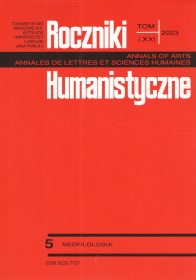Áreas críticas na aprendizagem de Pretérito Perfeito Simples e Pretérito Imperfeito do Indicativo Português por aprendentes polacos e búlgaros de PLE
Problem Areas in the Learning of the Portuguese Past Perfect Simple and Past Imperfect by Polish and Bulgarian PFL (Portuguese as a Foreign Language) Students
Author(s): Edyta Jabłonka, Vesela ChergovaSubject(s): Language and Literature Studies, Foreign languages learning
Published by: Towarzystwo Naukowe KUL & Katolicki Uniwersytet Lubelski Jana Pawła II
Keywords: Past Imperfect; Past Perfect Simple; deviations from Portuguese L2; tense; aspect; Polish L1; Bulgarian L1; written production
Summary/Abstract: The present study aims to analyze the errors in the use of the Past Perfect Simple (PPS) and the Past Imperfect (PI) that occurred during a test carried out by Polish and Bulgarian university students of Portuguese, when trying to explain where they come from. The analysis, both quantitative and qualitative, is based on the contrast between Portuguese and Slavic languages in terms of tense and aspect. The errors in the use of PPS and PI indicate that the choice of PI or PPS raises doubts in foreign students of PLE in a non-immersive context, even if their mother tongues offer conditions conducive for a positive transfer. Taking into account the importance of PI and PPS in the construction of cohesive statements in PLE, the results obtained indicate the need to use innovative methods in order to reinforce learning at different levels of student proficiency.
Journal: Roczniki Humanistyczne
- Issue Year: 71/2023
- Issue No: 5
- Page Range: 39-54
- Page Count: 16
- Language: Spanish

